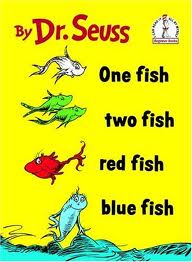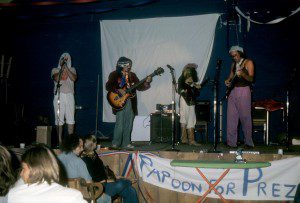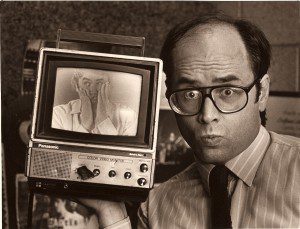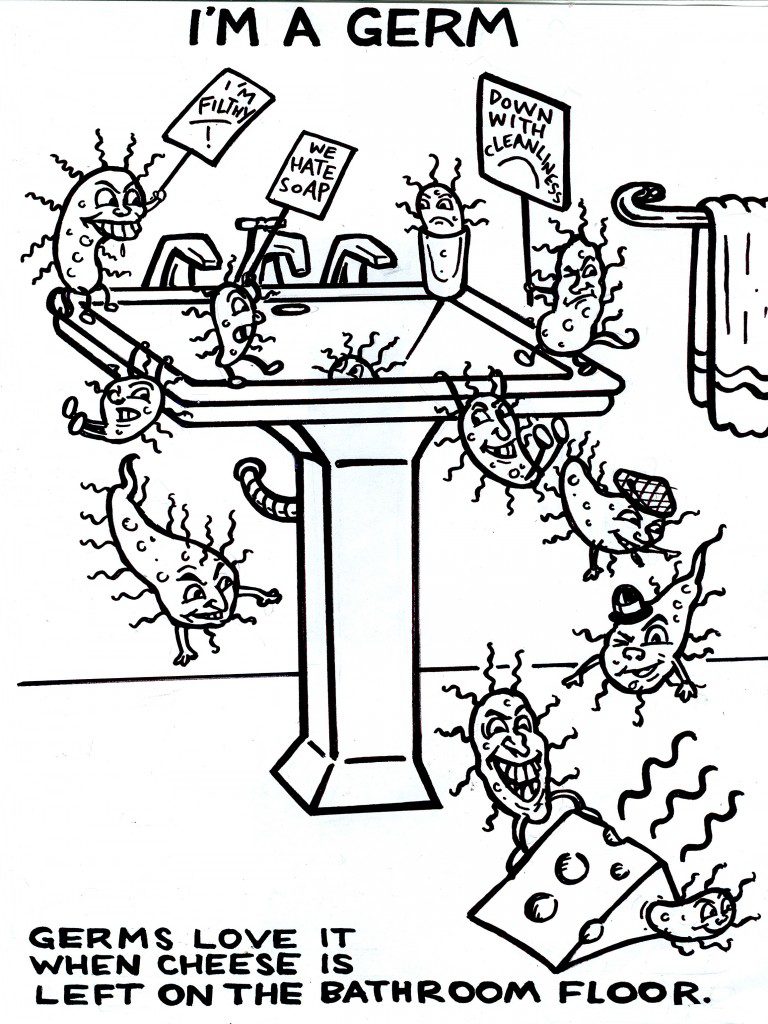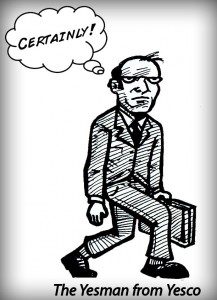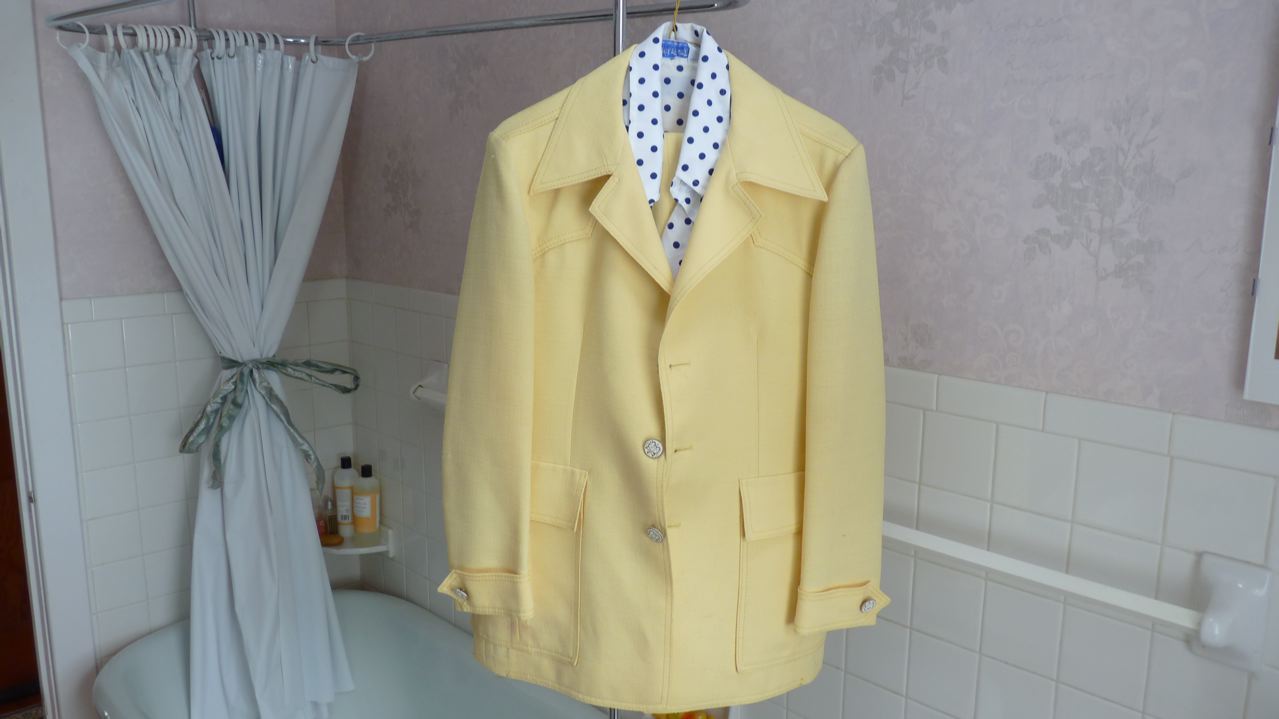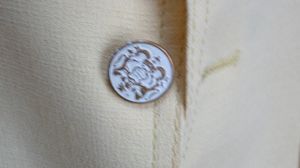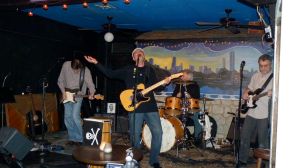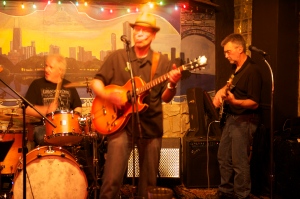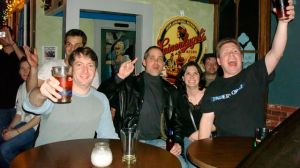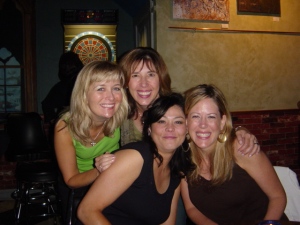They say that attitude is everything. By societal standards, I have a bad attitude.
I am not a big fan of anything with a pop prefix: Pop music, pop radio, pop culture. (I do like “Pop Goes the Weasel.”) Also not a fan of homogenized corporatization, mindless nationalism, dogmatic ideology, most reality and talent shows, most food products advertised on national television and let’s throw in much of social media behavior.
I am a skeptical optimist, walking the fine line that separates humanism, curmudgeonhood and flagrant relevance.
In the 60s, I liked the Stones more than the Beatles. I liked Elvis only before he went into the army. I revered Mad Magazine, Monty Python, Captain Beefheart, Paul Bowles and Lester Bangs.
Now that we have that out of the way, I invite you to listen to this quirky lament that I wrote and recorded (at Geoff DeMuth’s Little Pink sound studio).
Author Archives: rogerdaybain
Slumped Over
In 1969 I was captivated by Captain Beefheart’s release, Trout Mask Replica. It was distinctly un-pop, to put it mildly. It borrowed mainly from the blues and modern art but because the Captain’s ensemble, the Magic Band, was composed of long-haired, white-ish, hippie types, the album was categorized as rock. The Captain was doing for rock what Eric Satie had done for classical music—thumbing his nose at convention.
About a year later I would get my first guitar and begin to use it as my primary instrument in the lifelong pursuit of art, observation and catharsis. After I had mastered some chords, I graduated to a study of the early country blues practitioners—Blind Lemon Jefferson, 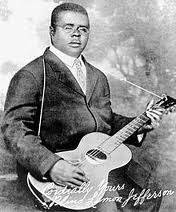 Robert Johnson, Mississippi John Hurt, Skip James, Blind Blake—and their singular picking techniques and sometimes obscure lyrical explorations. This led me to create my own guitar and songwriting style. Because we are all the sum of that which has made an impression upon us, I also had Dr. Seuss, first read to me by my mother, lurking in my thought waves. Kids are often exposed to radical thinking and I hope that never changes.
Robert Johnson, Mississippi John Hurt, Skip James, Blind Blake—and their singular picking techniques and sometimes obscure lyrical explorations. This led me to create my own guitar and songwriting style. Because we are all the sum of that which has made an impression upon us, I also had Dr. Seuss, first read to me by my mother, lurking in my thought waves. Kids are often exposed to radical thinking and I hope that never changes.
So about 1974 I combined all of the above and created the song, Slumped Over. Upon reflection, it is a nursery rhyme for psychedelic adults. It is a 4-act play for existential absurdists. I played Slumped Over several times with an early manifestation of the Barking Geckos, including a performance at the National Surrealist Party’s 1976 convention at Off The Wall Hall in Lawrence, Kansas.
I collaborated with Mitch Rosenow on a now lost recording of the tune in the living room of Mitch’s flat on Vermont Street in Lawrence. I recall that the recording featured slammed doors, thrown boxes of junk and lots of reverb.
Then, in 1982, I directed opera tenor John G. Andrews in a Slumped Over music video, shot mainly in the dingy basement bar of the Lawrence Opera House. John sang the song to the live accompaniment of my off-camera guitar and Dana Elniff’s saxophone while Gerry Cullen’s clunky video camera recorded the grainy shenanigans.
Finally, last August (or September?) I again recorded the song in my basement—what’s this thing with basements?—but this time with engineer, Chuck Kawal, placing the mics and twiddling the dials. Steve Eisen contributed a sax part and Chuck, after overcoming his exasperation at the melodic structure of the tune, played a guitar solo in the break. I played my guitar arrangement on both acoustic and electric and added some quite necessary kazoo parts. The song was finally getting a worthy sonic treatment. Chuck completed the mix just last week and it is now available for your listening pleasure. 40 Years in the making:
Screens
Where previously our gaze may have been out the window or across the alley or at a newspaper or book or scroll, it is now fixed upon a screen. Not all of the time, of course, but very frequently. I hope this turns out to be a good thing.
Television has been a gateway to our new path. It entranced us.
Then along came communication satellites….
…which opened the door for cable TV.
In the year I was born, few citizens could have envisioned computers, the web, smartphones or twitter. But those born during the past 30 years could not imagine life without these little screens.
Imagination has changed. The pathway to personal identity has changed. The way we interact with life has changed. The use of the word “friend” has changed.
I hope this is a good thing, don’t you?
The nature of screens will change.
What now requires a screen may one day require no screen, but this ever expanding connection to all humans, all information, is irreversible.
In the third grade I combed my hair like Elvis. Is it still my duty to keep up? Do I have a societal obligation, as well as a personal one, to remain current?
It can be a lot of work but I think that the answer is yes.
Now let’s go out there and provoke each other.
Short Little War
For a war to have any chance of succeeding, the citizenry must be sold on its efficacy. But should wars that need to be sold ever be started? As Superpower Team USA—which is what we have become since WWII—we rarely fight wars of necessity but instead fight wars based upon theory. These theories must be sold. Example theories:
• Communism is monolithic. (Viet Nam)
• Getting rid of the evil dictator will solve the problem. (Iraq)
• Democracy (voting) is a cure all. (Entire Middle East)
• Everybody wants our system.
One of the main selling points for many of our wars is their purported brevity. Because of our overwhelming force, this will be over in no time, says the leader. The reality seems to be that you don’t really get over war. Our own civil war, which ended 150 years ago, still seems to be chugging along. The rebel flag still flies in many parts of the South.
Wars are not short. But they are lucrative. According to a 2012 study by Deloitte, the U.S. aerospace and defense industries employ over a million workers and pay about double the average national salary. They generated $324 billion in revenue in 2010. According to the Council on Foreign Relations study, our U.S. military spending hovers around $700 billion annually. Our country spends close to 40% of the world’s total military expenditure. With numbers like these, an endless series of short little wars seems inevitable.
She Stoops To Conquer
Much of what I create has a Limey sensibility—at least it amuses my English cousins. She Stoops To Conquer is a farcical British play of manners written in the 18th century by Oliver Goldsmith. After attending a performance of the play at London’s National Theater, I was inspired to write a song using the same catchy title. Literature and history are great sources for songwriting.
Disclaimer: I did not attempt to mimic the plot of the play but instead made an attempt at capturing a feminine archetype. This song has not been previewed by any members of the National Theater Company but they are welcome to do so.
No doubt the song could have used a lute but because there was not a lute in his house, Geoff DeMuth provided mandolin accompaniment. He also engineered.
I’m A Germ
The flue season of early 2013 has been big news but will be soon forgotten. For now, there are endless warnings of how to avoid germs. The only solution seems to be to avoid people. NBC’s Dr. Nancy Snyderman tells us that we should all stay at least 6 feet apart from each other until April.
Fact Alert: Microbiology pioneer, Antonie Philips van Leeuwenhoek, is generally credited with being the first human to see germs using his 17th century microscope. (He reportedly became romantically involved with several germs.)
But what about germs? They have lives too. And they enjoy a good frolic. And once you get to know them, they’re a lot like we are. They just want a good piece of cheese.
Have a listen to the song below. From the collection, My Mailman Has a Tail.
(copr. R. Bain, 2010)
Yes Man From Yesco
One of the more annoying personalities on the planet is the yes man.
This creature lacks imagination and self-respect. Riddled with the fear of what others might think of his ideas—especially the boss—he cowers behind a torrent of “yes-es.” He doesn’t want to rock the boat. And he definitely doesn’t wish to steer the boat. He just wants to remain in the good graces of the captain.
(A creature who is more annoying—even despicable—is the leader who surrounds him or her self with yes-spouting sycophants.)
In the workplace and the marketplace of ideas, a balance must be achieved between the notion that you are always right and the notion that your opinion is not worthy. Many unworthy opinions reach fruition. And many brilliant ideas remain caged within the minds of the timid.
Play this tune for your boss or co-workers. If you are the boss, share it with the board. Make a Powerpoint. If you’re simply bored, play it for thyself.
I’d Love To Be Rich
Wealth is aspirational. For every 1,000,000 who dream of becoming wealthy (hitting the lottery), only a tiny fraction can succeed. After all, how much room can there be at the top? The aspirants tend to overlook this statistic.
I penned “I’d Love To Be Rich” as a spoof from the viewpoint of a regular sap with daydreams of dough. Recorded in Lawrence, Ks. in 1981 or 82. The Geckettes provide the oooh wahh ooohs.
Gotta Have a Leisure Suit
In the 70s, nothing was more anti-bohemian than the polyester leisure suit. It stood for all that was crass and square in modern, clueless, adult pop culture— disco style replacing freakwear.
Leisure suits are now considered costumes but in 1978 they were worn in a serious way. Fashion ugliness had reached a zenith. By about 1980 they had lost their luster.
In 1980, when the barking Geckos were re-forming, I put a classified ad in the Lawrence Daily Journal World asking for the donation of unwanted leisure suits, needed as a performance prop for a song of mine, Leisure Suit. Two women answered the ad. I obtained one exceedingly bright yellow number and one of a dull shade of green. Could not locate the Holy Grail color: lime green, the suit mentioned in the song. Dull, colorless green would have to do.
My son borrowed the bright yellow suit for his culturally upending dance performance with S. Hack at the South Junior High Variet Show circa 1996 or 97.
Here’s the only recorded version of the song from 1980 Barking Gecko performance at The Lawrence Opera House.
A Night at the Gallery Cabaret with UTK
This is the place….
The Gallery Cabaret is a corner bar with live music 7 nights a week. And never a cover charge. It’s the best place to catch UTK, aka Under The Kitchen. Next Show: April 13, 2013.
The meaningful paint job puts you in the mood before you even enter.
Stay tuned for our next performance here. You are most welcome.
The interior lighting adds to the atmosphere. We are in a laboratory— a petri dish of existentialism.
The place is anti-pop. You know you’re not in the suburbs anymore when you’re in the GalCab. You’re far from the boondocks, too. The nearest wild animal is a rat.
This would be a likely spot to take a tourist from New Zealand.

For those with hair, it’s a good place to let it down.

The walls are littered with art done by folks.The bar staff handles the action with a style that ranges from wacky to nonchalant. Kenny is the owner. In the next photo he’s way at the end of the bar, though looking away from the camera.
The patrons are music aficionados, hipsters, daily drinkers, musicians, out of work comedians, and assorted misfits who may or may not have a reason to get off their barstool. Everyone is out to have a good time.
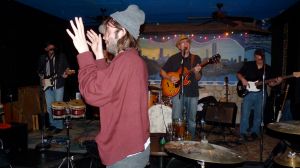
UTK has played about 10 gigs at the Gallery Cabaret. It makes for an entertaining night out.
Suffering from mildew buildup of the soul? UTK can help.

Here’s a verite video that will allow you to experience the flagrant relevance of this corner bar. Our cover of Champagne and Reefer.
For more UTK vids: http://www.youtube.com/user/UnderTheKitchen?feature=watch


